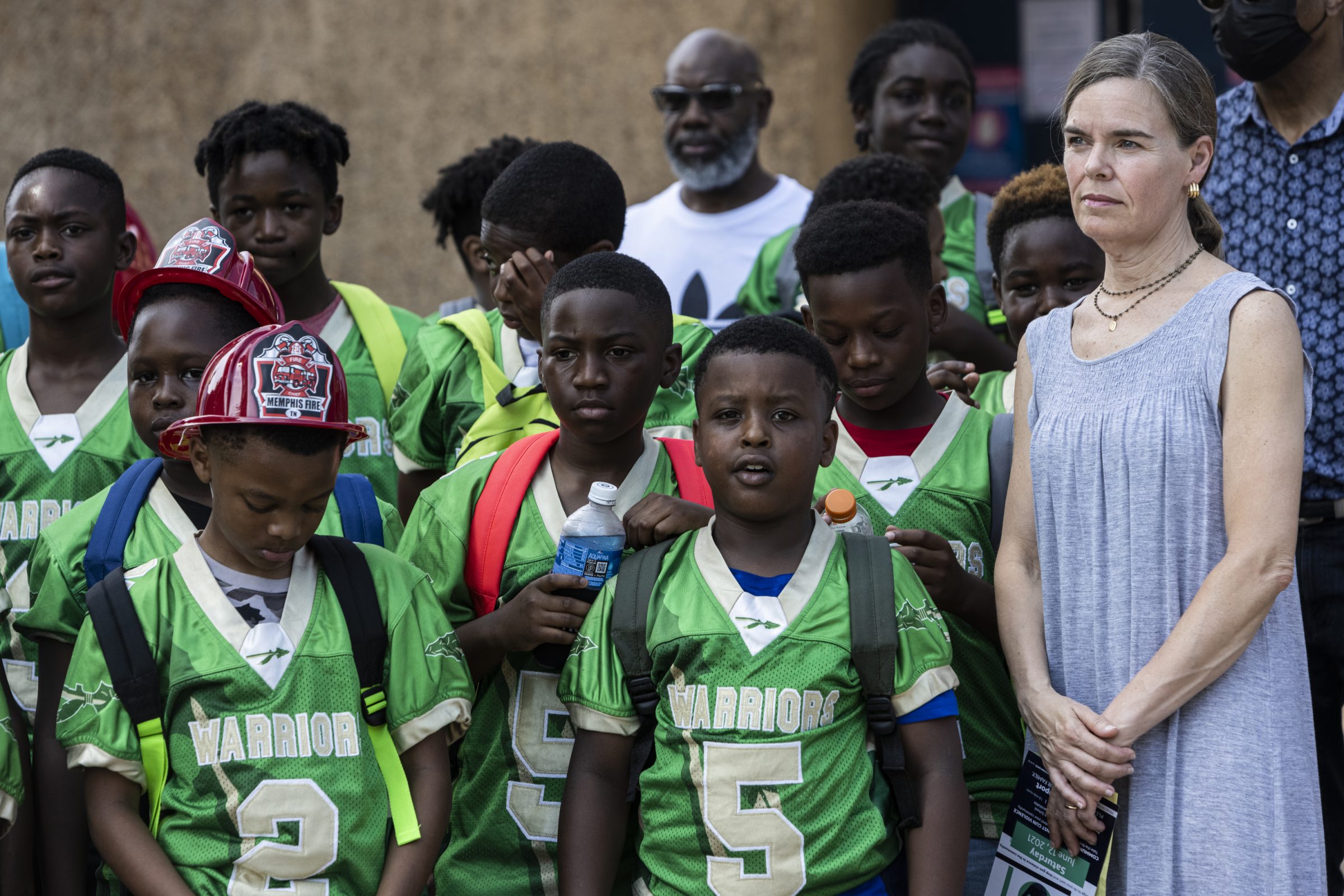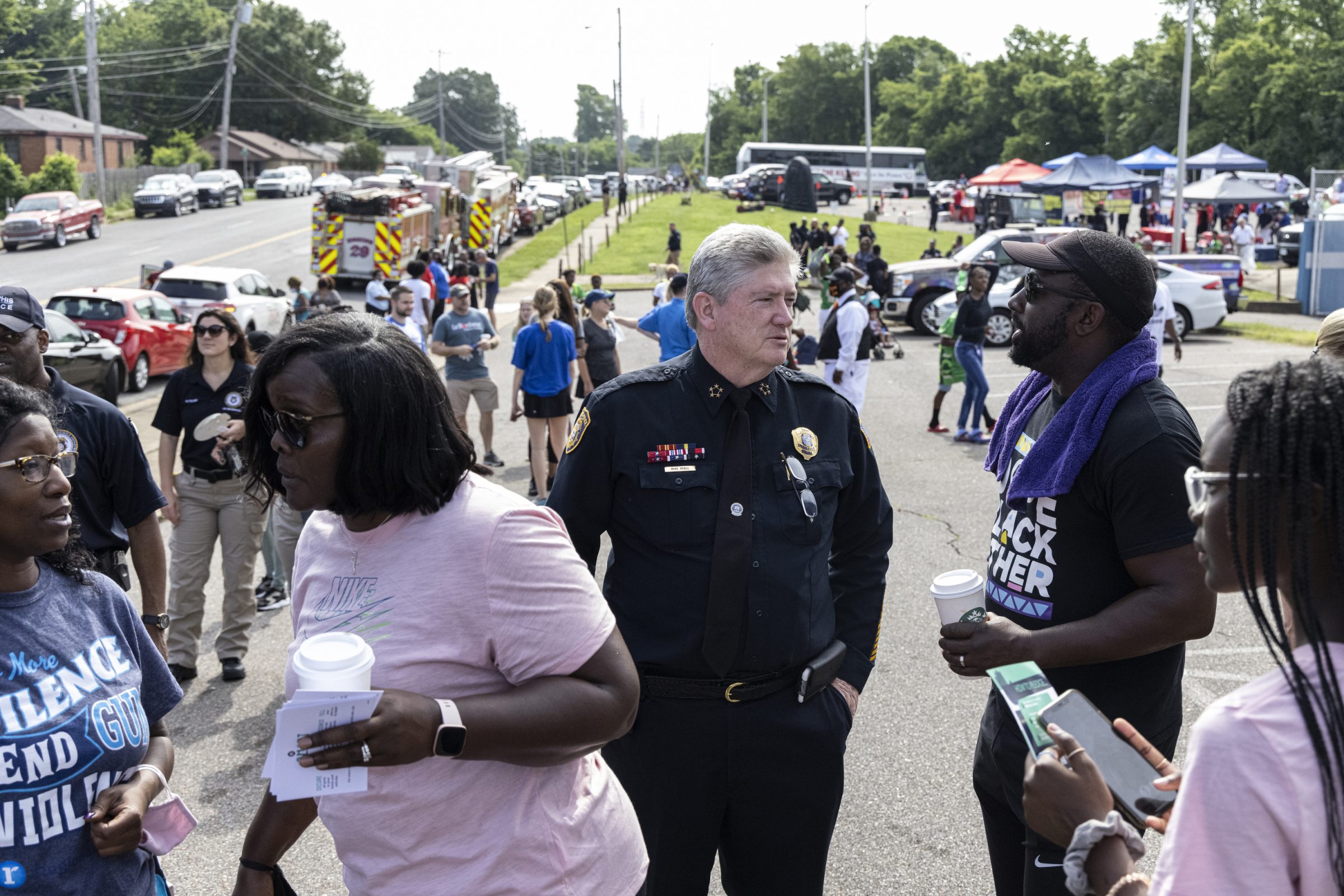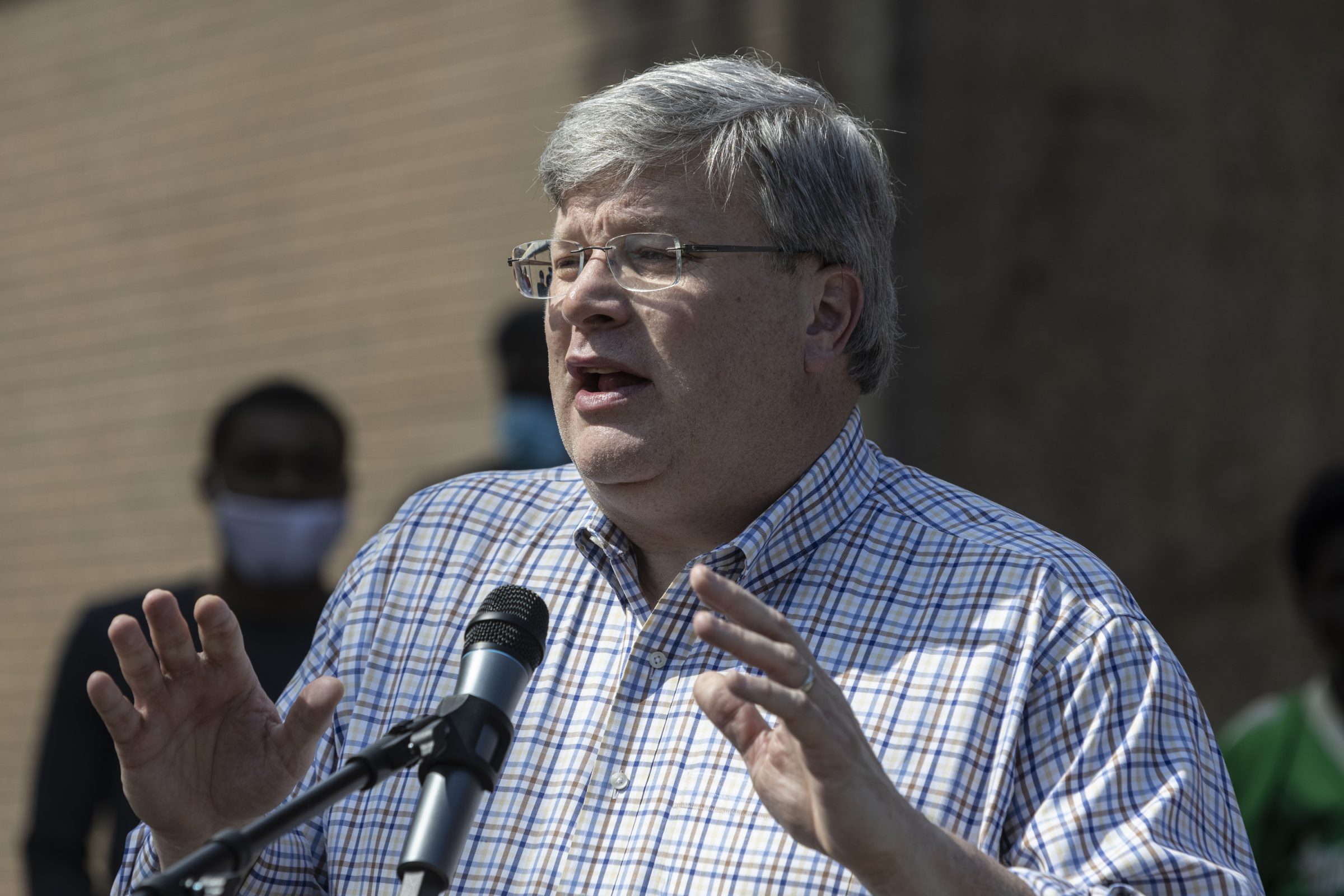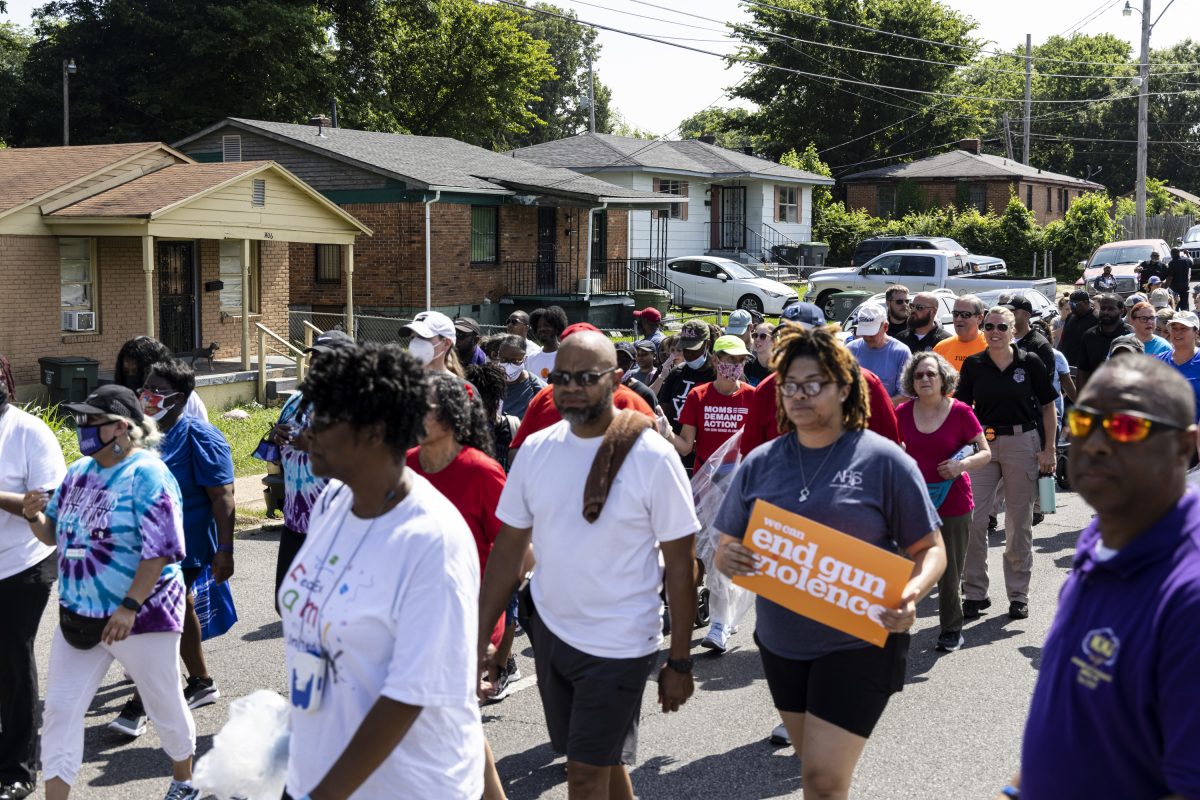This story is co-published with MLK50: Justice Through Journalism, a nonprofit Memphis newsroom focused on poverty, power and public policy — issues about which Dr. Martin Luther King Jr. cared deeply. Find more stories like this at MLK50.com. Subscribe to their newsletter here.
A new Tennessee law that allows most adults to carry a handgun without a permit could lead to more tragedies in Memphis Black communities already beleaguered by gun violence and exacerbate tensions with police, some local and state leaders said.
The law goes into effect Thursday and allows most people 21 and older to carry a handgun, openly or concealed, without a permit or training. The measure was pushed through by a Republican-controlled legislature and signed by Republican Gov. Bill Lee on April 8, despite opposition by Democrats and some law enforcement organizations and local officials.
Memphis community leaders, including Stevie Moore, fear what may come next.
“It makes me sick in the stomach to think about July 1,” said Moore, founder of Freedom From Unnecessary Negatives, a nonprofit focused on ending gun violence.
Moore was among a large group that gathered June 12 at Hamilton High School for a “Unity Walk Against Gun Violence” through South Memphis. Students, religious leaders, elected officials, and mothers with shirts commemorating their slain children called for a collective effort to end shootings in Memphis.
Now, Moore is bracing himself for the “wild, wild west,” he said.
The Rev. Melvin Watkins, pastor of Mount Vernon Baptist Church-Westwood, said the law indicates the legislature is careless and insulated from the consequences of gun violence.
“They don’t see our children, they don’t see our boys and girls, they don’t see (people getting shot) driving down I-240. They don’t see all of that,” Watkins said. “If they saw what I see, they would not be trying to pass laws to make it easier for individuals to (carry) guns without permits.”
Lee pushed the measure as a part of his “public safety agenda” and said it would make Tennessee safer, the Tennessean reported. However, local officials, including Mayor Jim Strickland and Police Chief Cerelyn “C.J.” Davis, expect the opposite. Strickland has said he thinks the change will lead to more gun violence, while Davis has said it complicates traffic stops.
The law comes as both officials are looking to tackle Memphis’ rising crime rates, which match a national uptick. New guidelines for federal COVID-19 stimulus dollars will allow the funds to be spent on public safety, including hiring new officers for MPD, Strickland announced last week.
It was the same day President Joe Biden’s administration announced a “comprehensive strategy to combat gun violence and other violent crime,” which includes allowing local governments to use American Rescue Plan Act funds in the fight. The money can be used for preventive measures, including hiring more police officers, for community violence intervention and efforts to stop the flow of illegal firearms.
The strategy does not address right-to-carry laws.
Homicides rose 30 percent in large cities last year mainly due to the social and economic stress of the pandemic, according to a study from the Council on Criminal Justice cited in the White House’s comprehensive strategy plan. In Memphis, between January and March, there were 1,576 gun-related violent incidents, which is up 30 percent over last year, according to data from the Memphis Shelby Crime Commission.
A 2018 study by the National Bureau of Economic Research found that right-to-carry laws are associated with a 13 percent to 15 percent increase in violent crime 10 years after they’re enacted.
Members of law enforcement oppose the new law, including the Tennessee Sheriffs’ Association, the Tennessee Association of Chiefs of Police and the Tennessee Bureau of Investigation.
A representative for Shelby County Sheriff Floyd Bonner Jr. said in a statement that Bonner supports the Second Amendment but doesn’t support permitless carry because it doesn’t offer training and education before gun owners can carry their weapons.
“The current (Tennessee) handgun carry process allows for background checks and a minimum level of training or verification of training in the use of firearms,” the statement says. “It provides for training about the state’s firearm laws, and education in the correct use of firearms, such as when someone can employ the firearm to protect themselves or others.
“There is a process to obtain a license to drive an automobile, which ensures your ability to operate the vehicle and the testing of your knowledge about traffic laws. There should be similar common-sense requirements before a 21-year-old can start carrying a firearm in public.”

Fears of escalation
The law change doesn’t apply to people legally prohibited from owning a gun, including those convicted of felonies.
Republican legislators have framed the change as protecting the Second Amendment with “constitutional carry” and argue it will increase public safety.
“That’s marketing,” said Democratic state Rep. Antonio Parkinson, whose district covers parts of North Memphis. “It doesn’t matter how they frame it, it still has its consequences.”
Parkinson worries the new law could lead to an escalation in armed confrontations.
“I’m concerned that there could be more (shootings) because the access (to guns) is completely there, now. We don’t know the mental conditions of the people that are carrying. You don’t know where a person is at any moment. It doesn’t necessarily have to be that they’re mentally ill. It could be a whole host of things.”
Parkinson is also concerned that the loss of required classes for a permit could result in new gun owners misusing their weapons out of ignorance of gun laws. Additionally, while the bill supposedly expands gun liberties, Parkinson doesn’t expect Black gun owners to receive the same grace as white gun owners.
“We already know the law is not applied evenly when it comes to minority populations and others, and so I look at who will be charged and convicted in cases where people use stand your ground laws as a defense.”
The new law removes the offense of carrying a handgun without a permit but raises the penalties for other gun-related offenses. Theft of a firearm is raised from a misdemeanor to a felony under the new law and people convicted of felonies who are caught with firearms cannot be granted early release.

Increasing tension between citizens and police
Moore, the community leader, thinks the law will widen the trust “gap” between police officers and communities like South Memphis. Democratic state Rep. Jesse Chism agreed.
“It’s going to feed an already tense environment between police officers and citizens of color. I’m afraid one unintended consequence of this bill will be more police shootings,” Chism said.
The Memphis Police Department will adjust its training given the change, said James Ryall, who was interim director when he attended the “Unity Walk Against Gun Violence” on June 12. Usually, an officer can legally approach an armed person and ask for their permit, but after the law goes into effect, that won’t be the case, he said.
“It does create a little tension and concern,” Ryall said. “Knowledge is power, so we’re going to help educate our officers about the new law, about things they can and can’t do,” Ryall said at the walk. “It is pretty eerie for officers because we don’t have to sit here and talk about what guns can do. And when an officer approaches someone who’s armed, not having that ability to check it out, it’s going to create that ‘unknown zone’ and that’s a strong concern to our fellow officers out there.”
Moore contends the heaviest consequences of the change won’t fall on suburbs like Germantown and Collierville, rather on economically distressed communities in the “inner city.”
“They’re sitting up behind a desk, want to get reelected, and getting money from the National Rifle Association,” Moore said. “Most of them never been in South Memphis, they ain’t never been in North Memphis, ain’t been in Westwood, and won’t come because they’re afraid to come. They’ll pass (the law) because they’re in Nashville and they ain’t got to come to our community.”
Jonathan Cross, a Black gun instructor, believes the effects of the new gun law will be minimal because the existing permit standards are so low.
“People who have the permit, they haven’t really been trained; they are under the illusion that they’ve been trained,” Cross said. “What I’ve seen is that people who have permits have a very low probability of seeking additional training. They are more of a danger to themselves or a danger to society than they are defender of their own life, because they literally have not been trained.”
Cross, who spent part of his childhood in Frayser — an area that is fighting gun violence — argues a key to curbing gun violence is arming and training vulnerable communities, he said.
“I take issue with the phrase ‘gun violence.’ In my mind, there is no such thing as gun violence; there is violence. And people who are prone to commit violence, will commit violence in the face of people who do not have the ability to stop them,” Cross said.
And even with a permitting system, criminals don’t obtain guns legally, he said.
“Criminals will not go through systems to appropriately procure weapons of any kind, including firearms. But here’s what criminals will do: criminals will work their criminality with impunity in communities that have been conditioned not to be able to stop them.”

More guns, safer community?
Black gun ownership is climbing quickly as the National Shooting Sports Foundation, a gun retailers’ association, reports a 58.2 percent increase in ownership among Black people for 2020, the highest increase among racial demographics.
Cross argues Black gun ownership is vilified and discouraged, leaving Black communities vulnerable.
Although Watkins of Mount Vernon Baptist Church understands Cross’ position, he’s skeptical that more guns will lead to a safer community.
“I’m not saying that we shouldn’t protect ourselves. I want to address why we need to shoot and shoot back at each other in the first place,” Watkins said.
Mount Vernon has hosted a walk against gun violence through Westwood, but those steps toward awareness must be followed with economic steps toward progress, Watkins said.
A 2019 study published in the Public Library of Science medical journal shows factors like income inequality and poverty are drivers of homicide rates. Memphis’ 2019 overall poverty rate of 21.7 percent is nearly 10 percent higher than the national rate and nearly 15 percent higher for Black Memphians.
“It makes no difference if you walk against gun violence, (if) you don’t invest in those same communities, so that our young people have some productive, positive activities in the community,” Watkins said.
Moore agreed that walking isn’t enough.
“Most people at that (Unity Walk) don’t live in this community,” Moore said. “(They) walk and go back home. But the problem is still left after you go home. It’s a good camera shot; it’s good because it’s still trying to wake up the community to get involved. But after two hours, you’re gone, back to your safe environment, and we still got the problem.”
Moore invites state lawmakers to visit his community and others affected by gun violence.
“Come walk with me in the community,” Moore said. “Let’s go out in North Memphis, let’s go out in South Memphis, let’s go out in Orange Mound where the real people are dying. And if they’ve got any — any — compassion in their heart, they’ll change these laws real quick.”
County Commissioner Reginald Milton, who represents South Memphis, expressed a similar sentiment in remarks before the walk.
“They build the highways over us, so they can drive 60 to 70 miles an hour and not have to look at the poverty and despair and ignore what is happening here. We walk so they don’t forget.”
“We look at our children, we see them suffering, and they say what’s wrong with these children? … I say it’s not them. What’s the problem with our society that’s created this problem? They don’t make the guns; they don’t bring the guns to these communities; they weren’t born with these weapons,” Milton said.
“We put it in their hands and we tell them this is the only way you can make it. Then we blame them for their failures.”
Carrington J. Tatum is a corps member with Report for America, a national service program that places journalists in local newsrooms. Email him at carrington.tatum@mlk50.com
